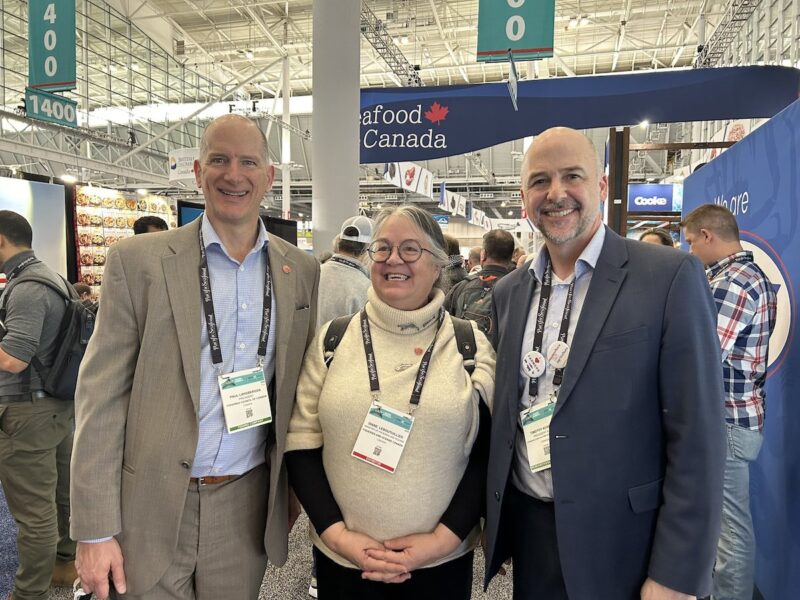No more salmon farm closures in BC pending transition plan
Fisheries Minister Diane Lebouthillier reiterates her stand on the aquaculture sector in BC as activists continue collecting donations to spread falsehoods about salmon farming.
By Fabian Dawson
SeaWestNews
There will be no more salmon farm closures in British Columbia until the government has finalised a transition plan for the open-net aquaculture industry on Canada’s west coast, Fisheries Minister Diane Lebouthillier has reiterated.
Speaking on the sidelines of her visit to the United States, Lebouthillier also said the government will not issue any new salmon farming licences pending the transition plan, which is expected by 2025.
“We are not shutting down anymore (salmon) farms, but we are not giving licenses to open more for the moment; healthy open net farming solutions need to be maintained at this time,” said Lebouthillier, according to a social media post by Michael-Ann Rowe an Emmy® Award-winning seafood advocate and journalist.
Lebouthillier reiterated her stance to Rowe, when answering questions during a tour of the Fulton Fish Market in New York.
Last December, during a visit to British Columbia (BC), the minister echoed her predecessor’s comment that that there will be no closure of aquaculture centres in 2025.
We’re going to present a transition plan, and then we’ll go from there,” she said.
But despite these continued assertions from the government over the years, anti-salmon farming activists have been falsely claiming they had been promised that open-net aquaculture operations in British Columbia will be banned by 2025.
The activists are now on a road show on Vancouver Island spreading the 2025-ban myth and other falsehoods about the province’s salmon farming sector, which support thousands of jobs and $1.2 billion in economic activity annually.
In BC, government decisions at the behest of activists, have already shut down 40% of salmon farms since 2020, increasing carbon emissions and wiping out jobs that are the lifeblood of rural, coastal and Indigenous communities.
Before the shutdowns the salmon farming sector was the largest agri-food export in BC. The sector employed approximately 6,500 people, produced close to 500 million salmon meals per year, received inputs from over 1,000 individual suppliers and had an economic value of $2 Billion.
Currently in BC, all existing salmon farms are supported by the First Nations communities that they operate in.
The Federal Government is now working with the industry, First Nations, coastal communities and other stakeholders to come up with a Transition Plan for salmon farming in British Columbia.
Aside from the Transition Plan, the government is currently considering extending existing salmon farming licences to operate for a period of between two and six years. The permits to operate the farms are set to expire at the end of June.
The Coalition of First Nations for Finfish Stewardship (FNFFS) is calling for the immediate renewal of long-term salmon farm licensing to encourage investments in emerging technologies as well provide Indigenous communities time to conduct research and trials on new technologies in their territories.
Canada is also currently working on finalising an Aquaculture Act, aimed to streamline the numerous overlapping and complex processes that is hampering the sustainable growth of the country’s seafood farmers.
It remains the world’s only major farmed seafood producing country without modern national legislation specifically designed to govern a responsible and sustainable aquaculture industry.
Meanwhile, speaking at the Seafood Expo North America in Boston, Minister Lebouthillier said commercial fishing, aquaculture and seafood processing are the economic engines that fuel many coastal, rural and Indigenous communities in Canada.
“To help this sector adapt, our government will continue to invest in the science, research and Indigenous knowledge we need to better understand our marine and freshwater environments,” she said.
“We will invest in innovation and technologies that help the sector reduce its carbon footprint and bring new products to domestic and international markets.
We will invest in partnerships both on and off the water so we can chart a path forward on the issues that matter most to people who make their living from the sea,” the minister said at the event.
The Seafood Expo, which ran from March 10 to 12, 2024, is the largest trade exposition of its kind in North America. It provides a global platform to showcase Canada’s high-quality fish and seafood products, and to share our best practices when it comes to managing fisheries and protecting our marine ecosystems.
The United States remains Canada’s largest export market for seafood, accounting for 64% of our exports, valued at $4.9 billion annually.
Currently in Canada, commercial fisheries and aquaculture generate $4.5 billion annually in gross domestic product and provide thousands of good middle class jobs, many in Indigenous, rural and coastal communities.
(Image shows Canada’s Fisheries Minister Diane Lebouthillier with Fisheries Council of Canada president Paul Lansbergen (left) and Timothy Kennedy, Canadian Aquaculture Industry Alliance President & CEO at the Seafood Expo in Boston.)

